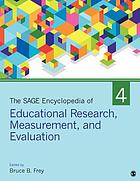
Resources related to an Array of Quantitative Research Designs. Be sure to check tabs for further content and resources.
This is a link to all materials related to Jon Wergin’s decision trees for making decisions on type of research designs:
https://libguides-phd.antioch.edu/inquiry-pathway/decision-tree
GSLC dissertations that illustrate various research study designs
Experimental – The materials in this tab cover true experimental designs with random sample selection and treatment and control groups.
The materials in this tab cover comparative study designs including before and after intervention studies and ex-post-facto designs.
The materials in this tab cover a range of correlational designs including regression and path analyses. Factor analysis is covered under the primary SCALES and MEASURES tab.
Includes books on a range of quantitative research designs
 Experimental design : procedures for the behavioral sciences
by
While there are a number of books on qualitative psychological research, this book is unique as it leads students step-by-step through the process of using qualitative research for doing your project and writing your report.
Experimental design : procedures for the behavioral sciences
by
While there are a number of books on qualitative psychological research, this book is unique as it leads students step-by-step through the process of using qualitative research for doing your project and writing your report.
Includes chapters on research designs
 Chapter 7- Nonexperimental Research
by
in Research Methods in Psychology - 2nd Canadian Edition by Paul C. Price, Rajiv Jhangiani, & I-Chant A. Chiang is licensed under a Creative Commons Attribution-NonCommercial-ShareAlike 4.0 International License,
Chapter 7- Nonexperimental Research
by
in Research Methods in Psychology - 2nd Canadian Edition by Paul C. Price, Rajiv Jhangiani, & I-Chant A. Chiang is licensed under a Creative Commons Attribution-NonCommercial-ShareAlike 4.0 International License,

Includes journal articles on research designs
Dissertations focused on quantitative research designs
Related to quantitative research study designs
This GM Lecture covers a wide range of quasi-experimental research designs including validity issues.
This is an easy-to-understand video by Daniel Storage, PhD from the University of Denver, on correlations.
This video by Doug Krull, PhD of Northern Kentucky University describes correlational research and the possible confounding effects or biases.
This is a comprehensive easy to understand review of types of quantitative research designs by Dr. Amanda J. Rockinson-Szapkiw.
This is a discussion by Dr. Michael Patton on research designs in the scholar-practitioner context including a discussion on epistemology and ontology. Dr. Patton is an independent organizational development and program evaluation consultant and former president of the American Evaluation Association, with a focus on making research useful.
Youtube video presented by Elaine Eisenbeisz, owner and principal of Omega Statistics covers a full range of topics related to study design, methods, survey research, sampling, validation, and analysis.